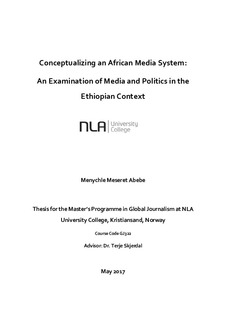| dc.description.abstract | The study of the media’s relation with the political system is a burgeoning area of inquiry in comparative media studies. A key framework in this regard is Hallin and Mancini’s (2004) 'Comparing Media Systems'. This study attempts to conceptualize the Ethiopian media system in comparative perspective based on globally renowned media systems models. More specifically, it asks whether these media systems models are fit to explain the Ethiopian media system and also attempts to identify unique features which should be considered in defining a suitable media system for Ethiopia.
The study was done using a qualitative research approach. Research data for the study was collected through in‐depth interviews with 11 purposively selected informants as well as document analysis. The analysis concludes that globally renowned media system models are inadequate to explain the historical development of media and politics in Ethiopia. Even though some features of the Ethiopian media such as a weak media market, low circulation of newspapers, dominance of electronic media, low professionalization, elite oriented press and absence of commercialization resemble elements of the polarized pluralist model, issues such as circulation of newspapers and the relationship between media and politics differ remarkedly from the model.
The research has also identified various distinct features that should be considered when defining a functioning media system model for Ethiopia. The nature of media and politics is seen to be influenced by the legacy of the previous regimes, the political history and philosophy of the current ruling party, international influences which have led to superficial liberalization, and underdeveloped media markets and institutions. Based on these factors and together with elements it shares with the polarized pluralist model, the Ethiopian media system can be understood as a media sector in need of development and an institutional environment which continues to be influenced by the ideas of both the past and current regimes, though still being sensitive to changes in the global world order. | nb_NO |
